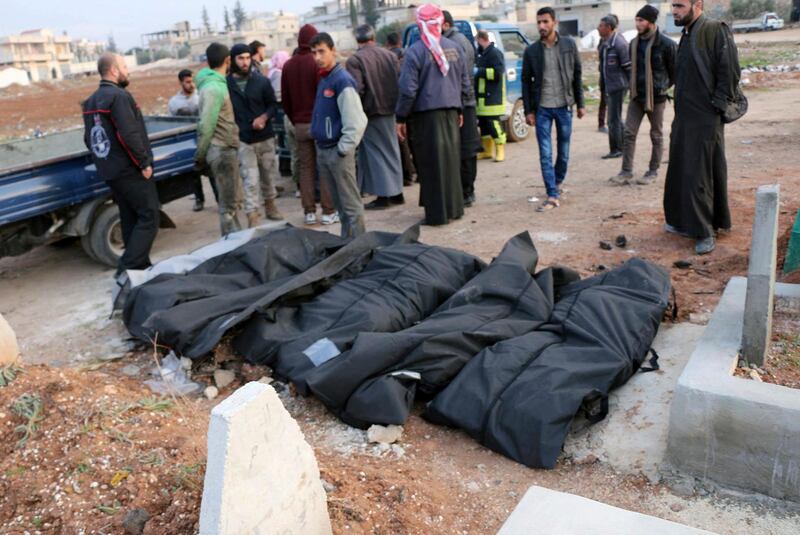When Mustafa Al Wetti hears the harrowing sound of air strikes, he doesn't run from them - instead, he rushes towards the crime scene to take photos of the wreckage with his phone.
The Syrian government's bombardment that he is documenting in Idlib has reached an unprecedented level, with the United Nations urging a month-long, nationwide ceasefire to allow access to humanitarian aid.
Idlib, Syria's last rebel-held province, is one of four areas to fall under a "de-escalation" agreement brokered by Russia, Iran and Turkey as a way to prepare the ground for peace talks. But the Syrian regime has intensified air strikes in recent weeks, hitting hospitals, levelling homes and killing civilians. More than 200 died in the past week alone in the Eastern Ghouta region, another de-escalation zone.
Mr Al Wetti, 27, joined other civil society activists and lawyers at a conference in Istanbul last week to discuss how evidence such as mobile-phone photos and videos could be used to achieve justice.
"I was there [in Idlib] just last month," he told The National. "Every time I enter a building that has just been struck, it's the same horrible scene. Children are crying, their parents have their limbs dangling from their bodies."
Mr Al Wetti saves each image and video on his computer in the hope that one day he will have the opportunity to show them as evidence against Syrian President Bashar Al Assad.
“In 1981 there was a massacre in Hama,” he explained, referring to the Syrian regime's killing of more than 500 members and sympathisers of the Muslim Brotherhood.
At the time, it was termed the single deadliest act by any government against its own people in the Middle East.
“But hardly anyone knew — if it happened today, we would have pictures and videos. It would be impossible to deny these crimes,” said Mr Al Wetti.
While thousands like him have tirelessly documented every moment of the seven-year conflict, many have encountered obstacles when using their documentation as evidence.
In 2017 YouTube implemented a new feature to detect extremist content through an algorithm — and by extension, deleted hours of footage documenting war crimes in Syria. While activists and technologists have been able to restore some of the channels, thousands more have been permanently lost.
Another shared frustration among civil society activists is that many of them are documenting the same events, but not co-ordinating with one another. Without efficient communication many fear that they are merely doubling their sometimes life-risking efforts across the country, but not the results.
“There needs to be a functional mechanism for co-ordination,” Yasmin, an activist who asked that her surname be withheld, said at the conference.
Yasmin believes there should be a collective effort to create a comprehensive list of names of those who are still missing or detained across the country. “Otherwise each of us are starting from the beginning, every time.”
The lawyers involved in building case files with the goal of prosecuting members of the Syrian government are adamant that each video and image needs to be carefully analysed and its authenticity verified.
“We have so many videos and pictures, but we need to make sure that we can verify each one. Plenty of people will try to discredit them if they see them, so we must learn new tools so that we can pay close attention to these details,” said Soha, a Syrian lawyer in Gaziantep who asked that her surname be withheld for security reasons.
She hopes to become better-versed in tools such as meta-data to cross-reference information about videos and images.
“This is our next fight,” she said.






